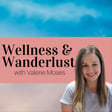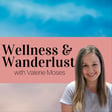
129. Naming, Processing and Embracing Our Emotions with Devon Loftus
How can we invite in our emotions without allowing them to overtake us?
On this week's episode, we're diving into all things emotions with a dear friend of the show, Devon Loftus, founder of Moon Cycle Bakery and one of our guests from Episode 49.
In addition to her work with Moon Cycle, Devon is a creative writing teacher, positive psychology practitioner and author of the new book “Dwell: A Journal for Naming, Processing and Embracing Your Emotions,” which will be released on April 18. Her book uses creative journaling prompts to invite readers to welcome all of their emotions without judgment or shame.
In our conversation, Devon shares why it is so important for us to feel our feelings. We talk about the different types of emotions we face and how they might affect us, why personifying our emotions can help us deal with them in healthier ways, how we can channel our anger during moments of injustice, and much more. Plus, Devon updates us on what’s happening at Moon Cycle Bakery, and we walk through one of the journal exercises from her new book.
If you enjoy this episode, please feel free to rate and review the podcast on whatever app you’re listening on, and share with a friend!
OUR SPONSOR
Are you ready to feel more energized, focused, and supported? Go to https://zen.ai/wellnessandwanderlust1 and add nourishing, plant-based foods to fuel you from sunrise to sunset.
CONNECT WITH DEVON
Website: https://devonloftuswrites.com/
Book: https://devonloftuswrites.com/books
Instagram: https://www.instagram.com/_devonloftus/
Substack: https://devonloftuswrites.substack.com/
CONNECT WITH THE SHOW
Website: WellnessAndWanderlust.net
Instagram: www.instagram.com/wellnessandwanderlustblog
Facebook: www.facebook.com/wellnessandwanderlustblog
Twitter: www.twitter.com/moses_says

